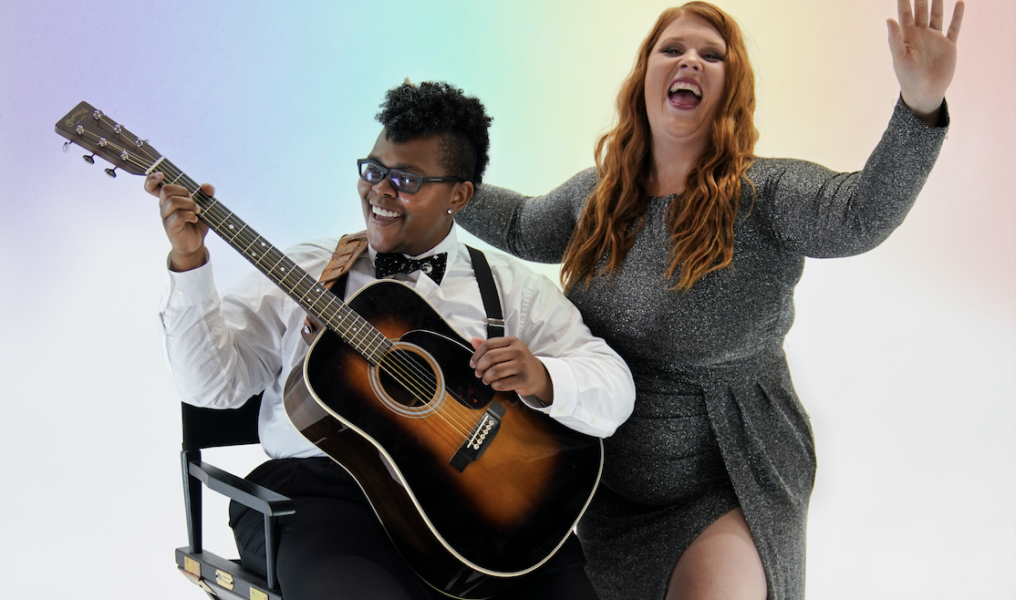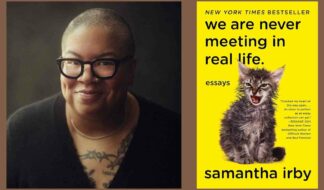Even at the best of times, Pride festivals are a reprieve from many of the daily struggles faced by the LGBTQ community. There, acceptance is given freely, and if done right, the celebration allows any and all participants to present as their most authentic selves. Now, as June approaches during a global pandemic, Pride month might seem like it's lost a lot of its luster as festivals across the globe are being canceled, rescheduled and indefinitely postponed. That's why LGBTQ musicians Heather Mae and Crys Matthews felt it was more important than ever to host the Singing OUT Virtual Tour at The Ark on Tuesday, June 16.
Viewers can buy tickets and view the self-described social justice musicians who have gotten together to create a supportive experience to "lift one another up" and "celebrate our stories and our people." The duo has hosted two previous in-person Pride tours and individually made careers out of tackling some of the toughest societal issues through music. Mae, who has been described as "the queer Adele," and Matthews, who has been called "the Woody Guthrie of our generation," have set up a virtual night of music, games and more. Ahead of the show, BTL caught up with Washington, D.C.-based singer Heather Mae to get her thoughts on the value of sticking together during hard times, her inspiration for this event and the importance of Pride.
What inspired you to put on this tour?
For many people, Pride is the only time that they can express the way they identify and they can be proud of who they love and they can not feel like a freak in their hometown. And every year for the last three years we have done a Pride tour where Crys and I go on the road and it's called Singing OUT and it's grown so much in the last three years, from not having anyone really show up the first year, to last year selling out a ton of the venues that we played. And this year we were going to be the biggest ever, we were playing bigger venues than we had ever played before, and we were set up to sell out in a bunch of them already. And then this COVID thing happened and festivals started getting canceled. And so, we made a decision that it's one thing for people to lose jobs from not playing shows, but for us, it's another thing where people are in isolation and in unsafe situations and Pride is being taken away. No. We will not stand by and watch that happen. So, we're making a virtual tour.
It's true, that sense of community feels like it's being lost for so many LGBTQ people this year. What was your first Pride experience like?
I actually attended my first Pride festival in my early 20s in New York City, that was like in 2006, but it wasn't until 2013 that I realized I was queer when I met my partner. And my whole world was broken open in the best way. But the first time I went to a Pride festival [as an out person] was in 2014, and it was the most free I felt my whole life. And I just realized that I was closeted when I was living at home, and I cannot imagine having homophobic parents — I mean, I can because of my fans — and having an unsafe environment and being forced to stay at home, no one's using your right pronouns, no one's calling you by your name, they're telling you to play it straight. And so, we had to do something.
Were you always inspired to write music? And what made you pursue social justice topics and themes in your work?
Right about the time I found out that I am queer as queer could be, I had to stop singing because I got [vocal] nodules. And that threw me into the greatest depression of my life. I realized that I had bipolar disorder, too, and I need to get help. So I stopped singing and I made a vow, a literal promise, to the universe or God or whatever, that if I got my voice back, I would dedicate my career to social justice music and to making the world a better place, which meant I would come out in my music. And about a year later I got my voice back. I immediately ran into the studio and put it to songs, released my first social justice album, and it became what I thought was me just being, "I'm queer, and I love myself, and I love who I am, and I'm fat and I'm body-positive, and I'm angry about women's inequality and my friends of color getting killed in the streets. I will not be quiet anymore." I realized that I was actually creating a fanbase of people who not only identified with all those things but also people who support those people as well. And without me trying to create a career around the social justice movement, it just happened.
Did you find your music to be more authentic once you came out?
Oh yeah, 100 percent. Yeah. I wrote songs that would be about women but the pronouns were "he," and I wrote songs that were catchy just so I could get a commercial to pick it up. I wrote songs that had no substance. There are times where you just write, and I was just clocking in, you know? That's why none of those songs— you can't find them anywhere on the internet. That's not who I was, that's not who I am, and if you listen back, it's not good (laughs). It wasn't good because it didn't have heart, and it didn't have a mission.
Are there any musicians who inspired you to take the path you're taking?
My colleagues inspire me to keep going. One musician, she actually is in Minneapolis, her name is Ellis and she's a lesbian and she's amazing and incredibly talented. The first time I saw her I, without even knowing I was, was sobbing watching her. She has this ability to so authentically connect with heart that I knew that that's somebody that's up on the stage right now doing the universe's work. And honestly, Crys, who is my tour mate. I saw her singing about Black Lives Matter and [I saw her sing about how] we must rise up again and that this is a new wave of social justice. We must keep going. We must persist. I could feel that, once again, this is somebody who is doing the work that they are meant to do. The people in the audience cannot help but feel moved just by her sitting in a chair singing her song.
A lot of artists are in the same situation and they're doing similar virtual performances. Has this unique moment in history inspired you to create more?
Yeah, definitely. For me, I started writing "I Am Enough," and it was my announcement to the world that I am a social justice songwriter, I'm changing everything, and I'm dedicating my career to building a legacy of making the world a better place, dammit. This career's hard enough, but I'm determined (laughs). So I released that, and then I went on the road and I toured for the next two years, and then I came home. And I realized that the one thing my fans kept talking to me about was mental health. And for me, I was just really struck by that. It hit me that I had never actually talked about that explicitly, and I knew it was because I'm so afraid of being labeled the crazy one, and that stigma around being insane. I'm already fat, I'm already queer, I don't need to add on another thing where people will other me, and I don't like anything that boxes me. And so, I wrote an album all about mental illness and the struggle of breaking away from those labels and trying to find the light in the darkness. And that is the thing that I've really been focusing on, and, my God, I hate to say that I'm so glad I released it now because my fans need it, but wow, right now it's really hard. It's a really, really weird time to be alive right now.
Singing OUT will be held on Tuesday, June 16, at 8:30 p.m. EDT. Tickets for the show are $15. To find out more information about the show visit theark.org.










